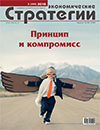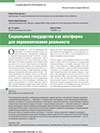The Social State as a Platform for Re-Quantization of Reality
The article continues the cycle of works studying the “crisis of crises” of the human population, caused by the “re-quantization of reality” — transition from obsolete forms of zoopopulation to the new psychosocial formation. The first part of the paper [1] has analyzed objective and subjective factors that prevent humanity from perceiving the image of a bright future at the moment of “reality re-quantization” — the quantum transition from outdated forms of zoopopulation to the new psychosocial formation: a sharp increase in the complexity level of all systemic constructions, including society, as well as attempts to preserve the obsolete global world order and stagnation of the mankind development through various methods of social destruction. As an answer to specific Russian question “what to do?” the authors suggest obvious things: revival and transition to the dominance of higher forms of motivation, development of moral and ethical qualities as respective anti-entropic factors and closing technologies as the highest form of the population livelihood — all the above on the social state platform
References:
|
1. Sundiev I.Yu., Frolov A.B. Obraz budushchego kak sistemoobrazuyushchii factor sotsiuma [Image of the Future as a System-Forming Factor for Society]. Ekonomicheskie strategii, 2019, no 2, pp. 100–107. 2. Anokhin P.K. Operezhayushchee otrazhenie deistvitel’nosti [Forward-Looking Reflection of Reality]. Voprosy filosofii, 1962, no 7, pp. 97–111. 3. Sudakov K.V., Kuzichev I.A., Nikolaev A.B., Shchelkanov V.I. Evolyutsiya terminologii i skhem funktsional’nykh sistem v nauchnoi shkole P.K. Anokhina [Evolution of Terminology and Functional Systems Schemes in the Scientific School of P.K. Anokhin]. Moscow, 2010, p. 37. 4. Fedorov R.Yu. Regional’nye tsivilizatsionnye landshafty: vvedenie v ponyatie i opyt rekonstruktsii [Regional Civilization Landscapes: Introduction to the Concept and Reconstruction Experience]. Istoricheskie, filosofskie, politicheskie I yuridicheskie nauki, kul’turologiya i iskusstvovedenie. Voprosy teorii i praktiki, 2012, no 5, ch. 2, pp. 193–200. Tambov, Gramota, available at: http://www.gramota.net/materials/3/2012/5-2/51.html. 5. Kapitsa S.P. Istoriya desyati milliardov [History of Ten Billion]. Sait S.P. Kurdyumova “Sinergetika”, available at: http://spkurdyumov.ru/biology/istoriyadesyati-milliardov/ 6. Sudakov K.V. Informatsionnyi emotsional’nyi rezonans [Information Emotional Resonance]. Moscow, RITs MGGU im. M.A. Sholokhova, 2008, p. 57. 7. Anpilogov A. Kosmos kak frontir: protsess prikhoda neizbezhnogo budushchego neizbezhno pomenyaet i nash s vami sobstvennyi mir [Space as a Frontier: the Process of the Inevitable Future Arrival will Inevitably Change Our Own World]. Zavtra. Blogi, available at: http://zavtra.ru/blogs/kosmos_kak_frontir. 8. Antropnyi printsip v teorii strun. Fizik Anatolii Dymarskii o temnoi energii, probleme kosmologicheskoi postoyannoi i filosofskoi revolyutsii Kopernika [Anthropic Principle in the String Theory. Physicist Anatoly Dymarsky about Dark Energy, the Problem of Cosmological Constant and Philosophical Revolution of Copernicus]. PostNauka, available at: https://postnauka.ru/video/84976?utm_referrer=https:%2F%2Fzen.yandex.com. 9. Kara-Murza S.G., Piskunov D.I. Nauka i ideologiya AN SSSR [Science and Ideology of the USSR Academy of Sciences]. Moscow, 1991, p. 76. 10. Dvazhdy dva ravno tri. Interv’yu ekonomista I. Shchetininoi korrespondentu gazety “Sut’ vremeni” Yu. Vysokovu [Twice Two Equals Three. Interview of the Economist I. Shchetinina with Correspondent of “The Essence of Time” Newspaper Y. Vysokov]. IA “Krasnaya Vesna”, available at: https://rossaprimavera.ru/article/d6fa4784?gazeta=/gazeta/299-300. 11. Prigozhin I., Stengers I. Poryadok iz khaosa: Novyi dialog cheloveka s prirodoi [Order out of Chaos: A New Dialogue Between Man and the Nature]. Pod obshch. red. V.I. Arshinova, Yu.L. Klimontovicha, Yu.V. Sachkova. Moscow, Progress, 1986, 471 p. 12. Franson M., Slanskii S. Kogerentnost’ v optike [Coherence in Optics]. Moscow, Nauka, 1967, p. 7. 13. Sudakov K.V. Izbrannye trudy [Selected Works]. Moscow, GU NII normal’noi fiziologii im. P.K. Anokhina RAMN, 2007, t. 1. Razvitie teorii funktsional’nykh system [Development of the Functional Systems Theory]. Moscow, 2007, p. 246. |



